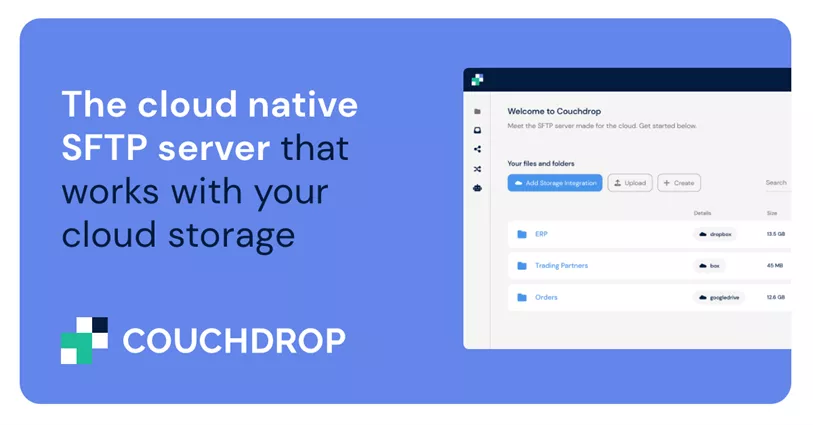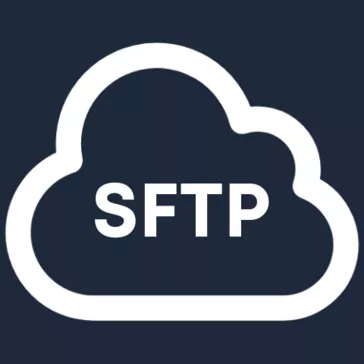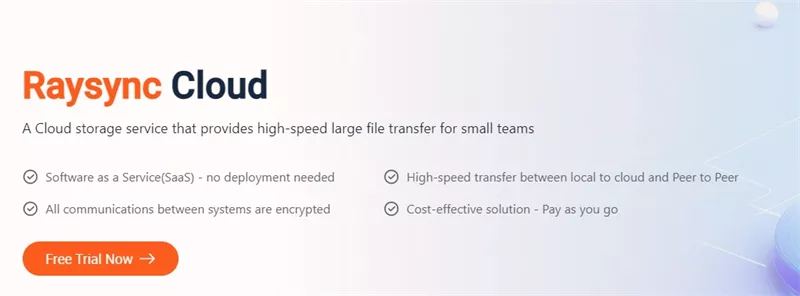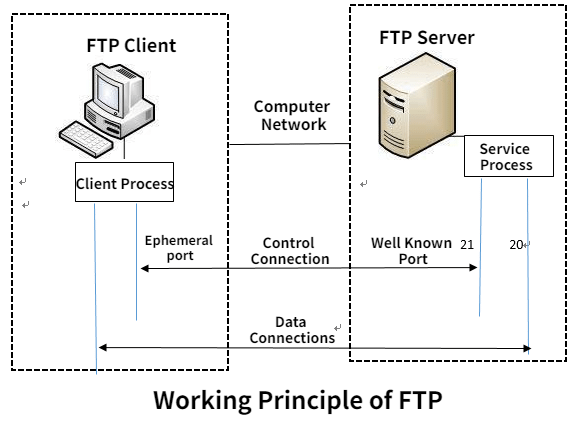Top 4 Cloud Based SFTP Online Solution [Fast Setup]
July 25, 2024Cloud-based SFTP (Secure File Transfer Protocol) tools have emerged as indispensable assets for businesses and individuals, offering enhanced security, scalability, and ease of access compared to traditional FTP servers.
But finding the best cloud based SFTP server can be a difficult choice. Lucky for you! This blog will explore the top four cloud-based SFTP tools known for their reliability and performance in handling large file transfers.

What Is Cloud Based SFTP
Cloud-based SFTP, or Secure File Transfer Protocol, represents a modern approach to file sharing and management that leverages cloud infrastructure for enhanced accessibility, security, and scalability.
Unlike traditional FTP, which relies on on-premises servers, cloud-based SFTP uses cloud storage and computing resources to facilitate secure file transfers over the internet.
This approach offers numerous advantages.
- It eliminates the need for organizations to maintain their own server infrastructure, reducing overhead costs and IT management complexities.
- Cloud-based SFTP provides solid security features such as encryption and authentication mechanisms, ensuring the confidentiality and integrity of transferred data.
- It supports seamless integration with other cloud services and applications, facilitating automated workflows and enhancing collaboration across distributed teams.
Overall, cloud-based SFTP enables organizations to share large files efficiently while maintaining compliance with data protection regulations.
It's particularly beneficial for businesses needing reliable, scalable solutions to manage and transfer sensitive information securely over global networks.
Best 4 Cloud Based SFTP Tools
Cloud-based SFTP tools offer effective solutions for secure file transfers and management. These tools leverage cloud infrastructure to enhance accessibility, security, and scalability, making them ideal for businesses of all sizes.
Let’s look at the top tools to find the right fit for your file sharing needs:
1. Couchdrop
Couchdrop is a online sftp solution that functions as a secure file transfer gateway. It allows users to easily transfer files between different systems and cloud storage solutions.

Here's a breakdown of its key features:
- SFTP Server: Couchdrop acts as a secure SFTP (Secure File Transfer Protocol) server, enabling users to securely upload, download, and manage files in the cloud.
- Cloud Storage Integration: It integrates with various cloud storage providers like Dropbox, Amazon S3, and others. You can connect your existing cloud storage or utilize Couchdrop's hosted storage option.
- Automated Transfers: Couchdrop allows you to automate file transfers using scheduled tasks. This can be useful for repetitive file movements between systems.
- Mailboxes and Inboxes: It offers secure file sharing functionalities through mailboxes and inboxes. You can designate specific locations within your cloud storage for easy file retrieval and sharing with collaborators.
- Multiple Protocol Support: Beyond SFTP, Couchdrop supports other file transfer protocols like FTP, SCP, and limited Rsync functionality.
2. SFTPCloud
SFTPCloud is a managed service that allows you to create secure file transfer servers using the SFTP (Secure File Transfer Protocol) and FTPS (File Transfer Protocol Secure) protocols.

SFTPCloud integrates smoothly with various cloud platforms, enabling efficient file sharing across different environments. With features like centralized management, real-time monitoring, and customizable workflows, SFTPCloud caters to businesses seeking reliable and scalable SFTP solutions.
Here are some of the benefits of using SFTPCloud:
- Simplified SFTP/FTPS Server Management: It eliminates the complexities of setting up and maintaining your own SFTP server.
- Flexibility with BYOCS: You can leverage your existing cloud storage investment for file transfers.
- Enhanced Security: Granular user controls and data encryption provide robust security measures.
- Scalability and Reliability: SFTPCloud can grow with your needs and offers high availability for reliable file transfers.
3. SFTP To Go
SFTP To Go is a managed service that provides secure file transfer functionality using the SFTP (Secure File Transfer Protocol) and related protocols.

Here's a closer look at what it offers:
- Secure Cloud Storage: At its core, SFTP To Go acts as a secure cloud storage solution. It allows you to upload, download, manage, and share files through a web interface or your favorite FTP client (like FileZilla, CyberDuck, WinSCP).
- Focus on Security: Security is a major selling point for SFTP To Go. They employ various measures to ensure your data's safety:
- Encryption: Data is encrypted both in transit (during transfer) and at rest (when stored).
- Secure Protocols: Only secure file access protocols are supported, including SFTP, FTPS, S3, and HTTPS.
- Authentication: They offer strong authentication options like passwords, public key authentication, and multi-factor authentication.
- Compliance: SFTP To Go claims compliance with regulations like GDPR and HIPAA, which can be important for certain industries.
4. Exavault
Exavault is a cloud based ftp service designed to simplify and secure the process of sending and receiving files.

Here's a breakdown of its key features:
- Secure File Transfer Protocols: Exavault supports various secure file transfer protocols, including SFTP, FTPS, and HTTPS. This ensures data privacy and integrity during transfers.
- User-Friendly Interface: It offers a user-friendly web interface for uploading, downloading, managing, and sharing files. Additionally, it allows access through FTP clients for those who prefer that method.
- Granular Access Control: Exavault provides granular control over user access. You can create user accounts, define their login methods, set permissions for specific folders and files, and even restrict download speeds or limit access expiration for shared files.
- Automated Transfers: Similar to Couchdrop (mentioned earlier), Exavault allows you to schedule automated file transfers for repetitive tasks, saving time and effort.
Cloud Based High Speed File Transfer Recommended - Raysync
Raysync Cloud offers an alternative to cloud-based SFTP servers. It's a leading provider of high-speed file transfer solutions, known for exceptional performance and security for organizations with demanding file transfer needs.

- High-Speed File Transfer: This is a core strength of Raysync Cloud. It boasts the ability to transfer large files and multiple files quickly and reliably.
- Security and Reliability: Files are encrypted both in transit (during transfer) and at rest (when stored) using industry-standard AES 256-bit encryption.
- Cloud Storage and File Management: Raysync Cloud offers cloud storage space for your files. While the base plan provides a decent amount, you can upgrade for additional storage if needed.
- Large File Transfer Capabilities: A key advantage of Raysync Cloud is its ability to handle large file transfers efficiently.
- Peer-to-Peer Transfer Option: In addition to traditional cloud-based transfers, Raysync Cloud offers a peer-to-peer transfer option. This allows for direct file transfer between two devices without going through a central server, potentially improving transfer speeds on local networks.
Whether you're in media, healthcare, finance, or any industry requiring secure and efficient file transfers, Raysync provides a reliable solution.
Its focus on speed, reliability, and data integrity makes Raysync a preferred choice for enterprises looking to optimize their file transfer workflows in the cloud.
FAQs about Cloud Based SFTP
Navigating cloud-based SFTP solutions involves understanding key aspects of their functionality and compatibility with cloud platforms.
Here are answers to common questions about deploying and using SFTP in cloud environments.
1. Is SFTP cloud based?
Yes, SFTP (SSH File Transfer Protocol) can be implemented in a cloud-based environment. Cloud-based SFTP services leverage secure connections over SSH to facilitate file transfers over the internet. These services offer the benefits of cloud computing, such as scalability, accessibility, and reliability, while ensuring data security through encryption protocols like SSH.
2. Does Azure have a SFTP service?
Azure does not natively support SFTP as a managed service.
However, SFTP can be deployed on Azure Virtual Machines (VMs) or implemented using third-party SFTP solutions available in the Azure Marketplace. These solutions enable users to set up and manage SFTP servers on Azure infrastructure, providing flexibility for secure file transfers within the Azure ecosystem.
3. Does Google cloud support SFTP?
Similar to Azure, Google Cloud Platform (GCP) does not offer native SFTP support as a managed service.
Users can deploy SFTP servers on Google Compute Engine instances or utilize third-party SFTP solutions from the Google Cloud Marketplace. These options enable organizations to implement secure file transfer capabilities on Google Cloud infrastructure, integrating SFTP into their cloud-based workflows effectively.
Conclusion
The adoption of sftp online solution represents a significant advancement in modern file transfer capabilities, offering enhanced security, scalability, and efficiency over traditional FTP solutions. These tools empower organizations to securely manage and share large files across distributed teams and global networks.
You might also like

Industry news
December 12, 2024Troubleshooting SFTP slow transfer speed issues? Discover practical fixes for SFTP slow transfer speed and explore Raysync, the ultimate solution for seamless file transfers!

Industry news
November 20, 2022File Transfer Protocol Server is a computer that provides file storage and access services on the Internet. Click here to learn more!

Industry news
June 21, 2024Explore four simple methods to know how to send high quality videos without losing clarity.